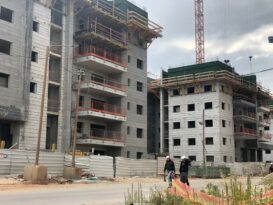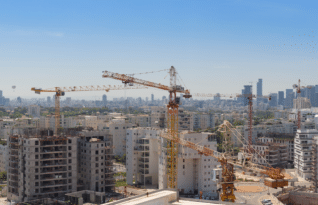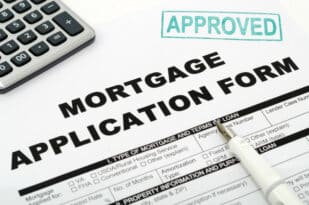For the first time in four years, the Bank of Israel announced that it will be increasing interest rates. What does this mean for borrowers and will rising apartment prices finally come down? Buyitinisrael analyzes the potential impact of this measure.
This month, for the first time in four years, the Governor of the Bank of Israel, Amir Yaron, increased the interest rate to 0.35% — 0.25% above the previous rate of 0.1%. According to the Bank’s economists, this is the first step in a series of interest rate hikes, which are expected to bring the rate to approximately 1.5% about a year from now.
Those who are expected to be immediately affected by this measure are those who already have mortgages and those who are currently seeking to take out a new mortgage. A higher interest rate means an increase in the mortgage components that are based on the prime interest rate (Bank of Israel interest rate + 1.5%), which, until now, was considered the cheapest. Admittedly, an increase of a quarter of a percent is not particularly significant, adding a total of a few tens of shekels to the monthly repayment of an average mortgage. However, according to the plan outlined by the Bank for the rest of the year, further increases will result in a cumulative rise of more than 1%. Once these measures come into effect, borrowers can expect a heavier financial burden.
So in the wake of the rise in interest rates that has already taken place as well as those ahead of us, should mortgage borrowers reduce the components that are exposed to the prime interest rate? This is still not clear, especially if you look at the alternatives: an index-linked or non-linked fixed interest.
According to a report published by the Bank of Israel at the beginning of the month, during the first quarter of the year, even before the rise in interest rates, Israeli banks increased the non-linked fixed interest rate on mortgages by an average of 1%. Thus, in our current times of sharp price increases, an index-linked rate seems like a risky gamble. Over the past year, the index has risen by 3.5%, with no signs of stopping. Consequently, despite the rise in the Bank of Israel’s interest rate, it is possible that linking your mortgage to the prime interest rate is still the best available option.
According to Dani Schecter, senior adviser at First Israel Mortgage, a mortgage brokerage that serves the Anglo buyer community, “While the media made a huge deal around the Governor’s announcement that the Bank of Israel would raise the interest rate by a quarter of a percent, the interest rate hikes that have taken place in the mortgage market by the banks have hardly received any attention, despite the fact that their financial significance is actually greater. The same is true of inflation which has been rampant in the past year. As a result, all of the index-linked mortgage components have seen a sharp increase, which has a much greater impact on the cost of the mortgage.”
Despite this, Schecter attributes a symbolic meaning to the Governor’s declaration. “This move breaks the ice. For six years, the interest rate has hardly changed, and a lot has happened in those six years — wars, COVID, inflation, and high unemployment, yet none of these have had an impact on interest rates. But now, a barrier has finally been breached, which means people are beginning to understand that the low-interest rates of recent years will not last forever. For the younger generation of 25-35 year-olds, who have lived most of their adult lives in a world of zero interest, an interest rate of 4.5%, for example, sounds very high. But people in their 40s and 50s remember days of 8%, 9%, and even 11% interest. To them, the current interest rate still sounds very attractive.”
The big question being asked today by everyone in the housing market, from buyers to investors to government ministers, is whether the measures being rolled out by the Bank of Israel will ultimately lead to a halt in housing prices, which, according to CBS data, have risen by more than 15% in the past year. According to Schecter, “Since the price of money is now higher, the demand for apartments should go down. To what extent is this really happening on the ground? At this stage, it is hard to say. The impact we are currently seeing is still minimal.”
It is possible that just a few weeks after the interest rate hike, it is still too early to assess the impact on real estate prices, which is why Schecter and his colleagues are not yet seeing any real change in the market. However, it is also possible that, yet again, the soaring real estate prices will prove to be immune to any measures that seek to moderate the market or reduce demand.
This brings to mind the tax increase on home investors that took place five months ago with the expectation that it will deal a blow to price increases. As of today, it seems that this move has not had any effect at all. It is likely that in such an extreme reality of sharp price increases, extinguishing the fire in the market will require a little more than a quarter of a percent increase in prime interest rates.








